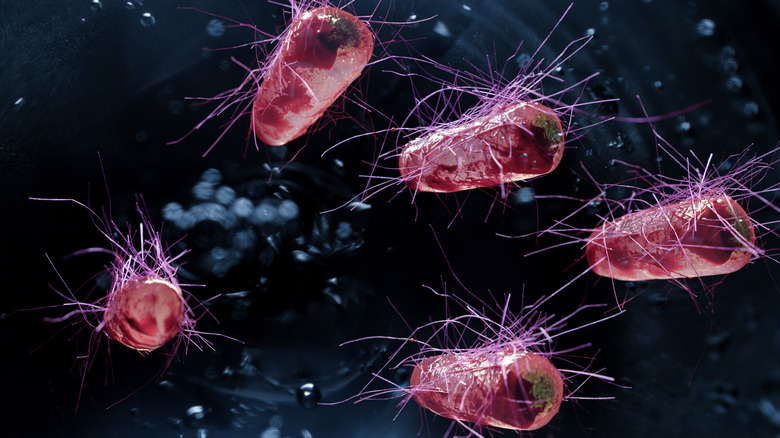How Is E. Coli Treated?
E. coli or Escherichia coli, is just one of the many bacteria that make their home in our bodies (via Mayo Clinic). While not classified as one of the beneficial types, most strains of E. coli aren't necessarily a threat nor will they cause severe illness. However, in some cases, certain strains of the bacteria can cause some unpleasant symptoms once they make their way into the digestive system. These include diarrhea, stomach distress, nausea, and vomiting. If you notice blood in your diarrhea, you've been infected by a strain that secretes a toxin, which ends up causing harm to the lining of the intestines. Additionally, one very specific strain can lead to kidney failure if not properly treated (per Cleveland Clinic).
If you find yourself suffering from an E. coli infection, it's likely that you've ingested contaminated food or water. This bacteria is commonly found in meats and dairy products, especially when they're undercooked or unpasteurized, respectively. In a similar vein, unpasteurized juices can also contain bacteria since they don't undergo a heating process to kill microorganisms prior to hitting supermarket shelves. Finally, since E. coli is ejected from the body in the feces, it can make its way into different water sources, including lakes and pools, where you may accidentally ingest it.
You may need to see a doctor if you experience symptoms of an E. coli infection for more than three days. However, there are steps you can take to help your body heal from the infection.
Plenty of rest and fluids are key
The good news is that most E. coli infections clear up on their own once the body effectively gets rid of the invasive bacteria, explains the Cleveland Clinic. However, you can definitely take steps to help your body heal, namely giving yourself the necessary rest while your system is under attack and ensuring you stay hydrated. This last step is incredibly important since you will be losing water if you experience diarrhea and vomiting. In fact, the Mayo Clinic advises choosing clear liquids and avoiding caffeine and alcohol while your body recovers. You should also stay away from high-fat and high-fiber foods to prevent excess strain on your digestive system.
You should also note that contrary to popular belief, taking antibiotics to treat an E. coli infection is not indicated as this can lead to complications (via the Cleveland Clinic). To avoid tampering with the body's ability to expel all of the bacteria, stay away from anti-diarrhea medications as well.
Keep in mind, you may need to be hospitalized if you've ingested the strain of E. coli that causes kidney disease, known as hemolytic uremic syndrome since your body won't be able to fight it on its own (per Johns Hopkins Medicine). Depending on your symptoms and the severity of the infection, doctors will hook you up to IV fluids and perform kidney dialysis. In some cases, a blood transfusion will also be necessary.


